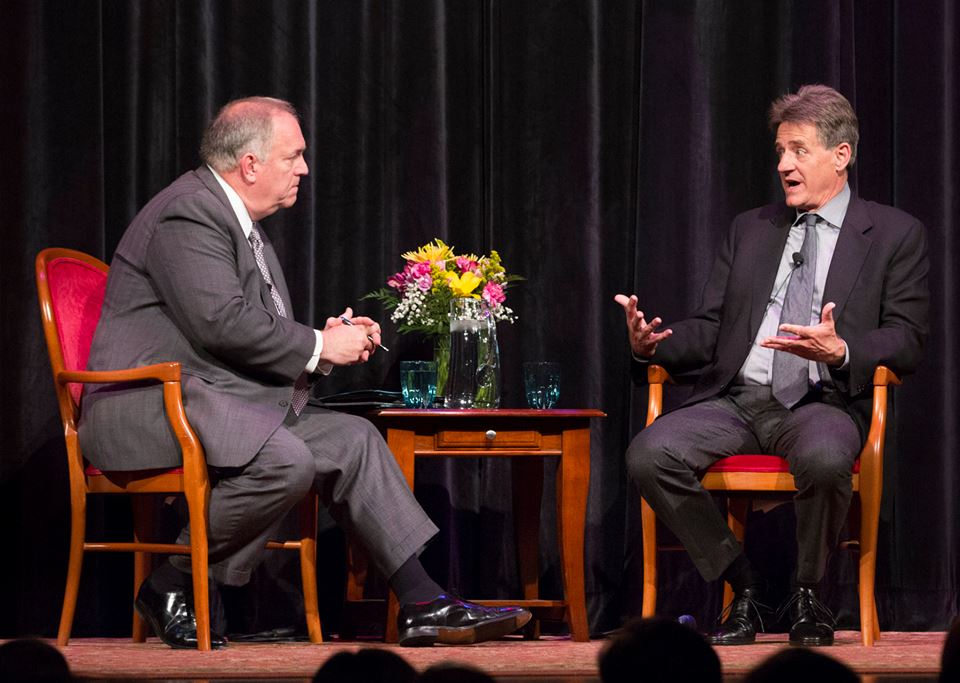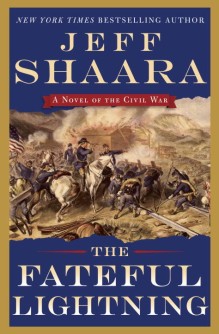 Tuesday, June 2, 2015
Tuesday, June 2, 2015
City Opera House, Traverse City
With special guest host Ed Tracy, CEO of Roxbury Road Creative and former CEO of the Pritzker Military Library
Event Sponsor: North Peak Brewing Company
EVENT RECAP
Hearing Their Voices
by Jacob Wheeler
Listen to the Program:
Facebook Photo Gallery from the event
Jeff Shaara remembers the moment that emotion overcame his father on a Civil War battlefield.
The late Michael Shaara, who wrote the Pulitzer Prize-winning classic The Killer Angels, was touring Gettysburg together with his son. A guide led them up Pickett’s Charge, the uphill path the Confederates took toward the Union Army’s guns. The battlefield visitors stepped over what was once a stone wall and found a Confederate flag planted in the ground. That, the guide passionately told them, was where General Armistead fell (and died from his wounds two days later). That point is considered the “high-water mark of the Confederacy.”
The elder Shaara fell to the ground and wept.
“My dad had no interest in history,” Jeff Shaara told guest host Ed Tracy, an award-winning television producer and founding Director of the Pritzker Military Library, before a packed audience at the National Writers Series in Traverse City, Michigan, on June 2. “He was a storyteller. And at Gettysburg he realized there was a story.”
The Killer Angels was Michael Shaara’s 1974 historical novel about the Battle of Gettysburg, a turning point in the Civil War. It was adapted into the epic 1993 film Gettysburg, which was produced by media mogul and Civil War buff Ted Turner. The elder Shaara died of heart failure in 1988, just shy of his 60th birthday.
Jeff Shaara picked up his father’s mantle, publishing several historical fiction books about the nation’s seminal conflict, including Gods and Generals and two novels that complete the Civil War trilogy that began with The Killer Angels. He appeared in Traverse City to kick off a lengthy tour for his new book, The Fateful Lightning. This year marks the 150th anniversary of the end of the Civil War.
“In every book I write, I try to have that moment, with every character I write about,” Shaara said referring to his father’s epiphany at the Confederate flag at Gettysburg.
In order to summon that moment, Shaara researches his subjects until he knows them intimately.
“People ask how I write the dialogue,” Shaara said. “All I’m doing is listening to a conversation and writing what I hear. I need to get to that point before I begin writing.”
He doesn’t mix the research with the writing. Doing so might curtail creativity.
“I don’t research and write, then research and write,” Shaara explained. “I research, take notes, and then write. I’ve got to get to the point when I’m ready. Then I don’t stop. I liken it to a faucet turning on. When the faucet is on, it doesn’t stop.”
In The Fateful Lightning, Shaara tells the dramatic story of the final eight months of battle from multiple perspectives: the commanders in their tents making plans for total victory, as well as the ordinary foot soldiers and cavalrymen who carried out their orders until the last alarm sounded.
He follows Union General William T. Sherman, who led some 60,000 soldiers on a march to capture poorly defended Atlanta in September 1864, followed by “Sherman’s March to the Sea” to take Savannah and to intimidate Georgia’s civilian population into abandoning the Confederate cause.
The South vilifies Sherman to this day for stealing food and livestock and burning the houses and barns of Georgians who tried to fight back. But Shaara found the general to be brilliant, even darkly prophetic about how warfare was evolving.
“Sherman was so far ahead of his time because he understood the concept of total war,” Shaara said in Traverse City. “Up until the Civil War, war was about chivalry. You stand and fight in a line…Sherman understood that to win a war you had to hurt people who were immune to being hurt.”
The Fateful Lightning highlights the complexities and nuances of this tragic conflict. From Nathan Bedford Stewart, an innovative cavalry leader and great Confederate general who nevertheless founded the Ku Klux Klan after the war, to the freed slaves who followed the Union Army on their march before realizing that the northern soldiers cared little more for them than had their southern plantation owners.
“The slaves are euphoric that they’ve been rescued by Union troops,” Shaara explained. His character, Franklin, worries about what’s ahead. “He begins to wonder, ‘We’re free. What does this mean? We’re following the army. When the war ends, what do we do then?'”
Shaara has written about other American wars too. The Rising Tide, The Steel Wave, No Less Than Victory and The Final Storm take us to World War II; To The Last Man is a novel about the First World War. But he told the Traverse City audience why the conflict between North and South is worth writing so many pages, 150 years later.
“Why did we fight this war?” Shaara asked. “It’s unique. Civil wars are fought all over the world today. But our civil war was fought over an idea. It wasn’t fought over looting, over treasure, over spoils, or over personality. World War I started over a personality. This was war fought over an idea – that holding people in bondage is wrong. And it was fought over the idea that, if you’re a state, you’re part of a greater union. No one else had the controversy that we had in the 1860s.”
Event was the first stop on his major national tour
New York Times bestselling author Jeff Shaara launched his national book tour on the publication date of his book, The Fateful Lightning, right here in Traverse City.
 MORE ABOUT JEFF SHAARA
MORE ABOUT JEFF SHAARA
Jeff Shaara is the critically acclaimed New York Times bestselling author of several historical fiction novels including Gods and Generals and two novels that complete the Civil War trilogy that began with his father’s (Michael Shaara) Pulitzer Prize-winning classic The Killer Angels.
ThE NWS event with Jeff Shaara was significant for several reasons:
- It took place on the 150th Anniversary of the end of the Civil War;
- It is the publication date for his new book The Fateful Lightning;
- And it served as the kick-off event for what will be a lengthy national book tour to promote his new book.
The Fateful Lightning is the concluding novel of Shaara’s epic Civil War tetralogy which tells the dramatic story of the final eight months of battle from multiple perspectives: the commanders in their tents making plans for total victory, as well as the ordinary foot soldiers and cavalrymen who carried out their orders until the last alarm sounded.
Jeff Shaara Chats Before Traverse City Interview | mynorth.com | 5/28/15
Pre-event interview
